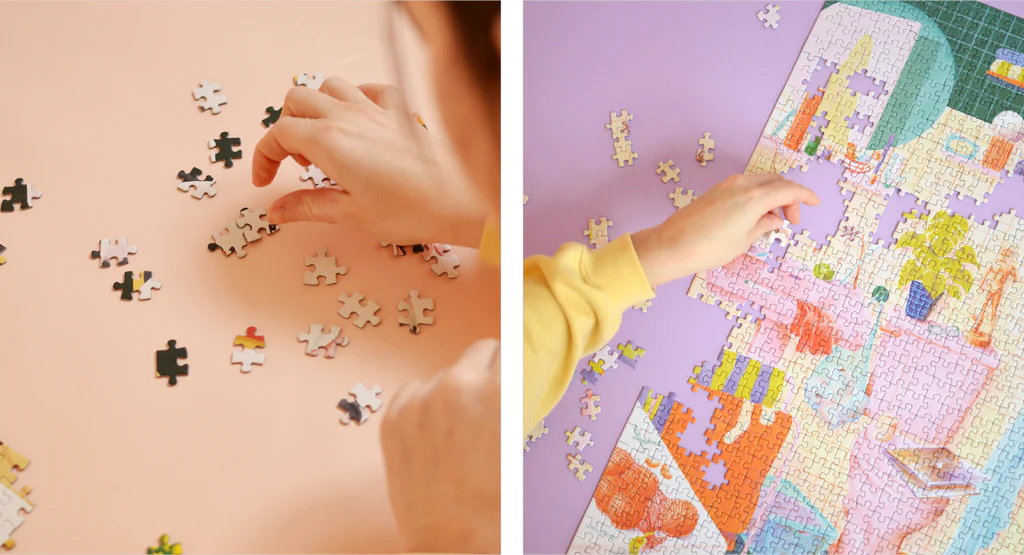03/14/2023 | By Laura Frechilla
The puzzle for adults has made a big comeback since lockdown, and rightly so! Until recently, it was still associated with an outdated and boring pastime. And yet, this game of patience is not just for children! Relaxing and stimulating at the same time, it has many positive effects on the brain and mind. So it's high time to do justice to this activity and reveal all the benefits of jigsaw puzzles !
A stimulating game of patience for the brain
A complex task for your brain
When you do this activity, you're using eight visual and spatial functions at once! That's what researcher Patrick Fissler found in a 2018 study . In order to reconstruct the image of the model, you have to connect clues. Among other things, you use perception, flexibility, memory, mental rotation, and reasoning.
🔎 First, you become a detective, using your spatial structuring skills. You need to identify the shapes and colors of the pieces, their orientation, and their arrangement in relation to each other. Next, you must deploy your strategic talents by following a certain methodology: sort the pieces, position the corners and edges, then complete the interior of the key elements.
Much more than a pastime, it is an exercise in problem solving. It requires processing several pieces of information at the same time to reconstruct a whole. The term "puzzle," which comes from English, refers to a riddle. And the more difficult the model, the greater the mental challenge you set yourself!
The benefits of jigsaw puzzles for all ages
The benefits of puzzles for young children have long been recognized. These games of patience stimulate cognitive development in children, helping them to develop their concentration, observation, and thinking skills. The effort required also encourages patience and perseverance, while helping them to better manage frustration.
For seniors, this manipulative activity helps improve dexterity. It requires precise movements to grasp the pieces, rotate them in different directions, and fit them together. In addition to maintaining finger flexibility, puzzles can also help preserve memory and slow down brain decline. An ideal gift for Grandparents ' Day!
And what are the benefits of puzzles for young adults, you may ask? Well, they are an excellent way to form new neural connections. By stimulating your cognition, this game of patience helps protect your brain from aging. And it's never too early to start preventing degeneration!
👉 See also: What is International Puzzle Day?
The benefits of jigsaw puzzles for morale
In a world that constantly overstimulates us, it's not easy to find leisure activities away from screens. Patience games offer the experience of focusing on the present moment while boosting self-confidence.
A puzzle as a meditative activity
Productivity, speed, performance, responsibilities... To reduce the stress associated with our hectic pace of life, we are advised to slow down and take a break. Disconnect to reconnect with ourselves? Yes, definitely, but how?
Mindfulness meditation to relieve tension is all the rage. But how can you really let go? Who hasn't been plagued by intrusive, obsessive thoughts during practice, such as "Why did I say that at that party? I look ridiculous...", or even existential questions such as "What if I changed jobs and went off on foot to Compostela on my own?
Puzzle games are a meditative activity that focuses your attention on a single task. By putting the pieces together, you can achieve a state of mental and physical relaxation that wards off negative or anxious thoughts. That is the greatest benefit of puzzles: time stands still, and you finally live in the here and now!
👉 Also read: 3 express techniques for quick relaxation
A challenge that boosts self-confidence
Completing a puzzle is a regular source of small satisfactions. For example, when you finish sorting the pieces, or when you finish assembling the edges. This accumulation of small successes reinforces your sense of control and boosts your self-esteem. And as the feeling of pleasure increases as you solve the puzzle, it is also punctuated by moments of intense euphoria! Hello, flow state!
What a thrill it is when you find a piece , after being convinced that the manufacturer had forgotten it or that the dog had eaten it! And what pride you feel when you place the last piece You admire the final result as if it were a work of art (unless you chose a picture of a kitten with a bow tie instead of snow falling, for example...) and refuse to put it back in its box right away!
This feeling of fulfillment that overwhelms us is biological. Solving a puzzle stimulates the region of the brain involved in the reward system. You enter a virtuous circle of motivation. The challenge is brilliantly overcome, you develop your self-confidence, and you will more easily dare to surpass yourself.
👉 See also: Puzzling records!
So, when will you get the 10,000-piece puzzle to fully enjoy the benefits of puzzling? Yes, we suspect you probably don't have enough space. In the meantime, you can always start with a 500-piece puzzle or 1,000-piece puzzle to choose from in our store!


The Green Class - 1000-piece puzzle


The Fridge Door - 1000-piece puzzle


Eating Out - 1000-piece puzzle


Nothing to Wear - 1000-piece puzzle






















